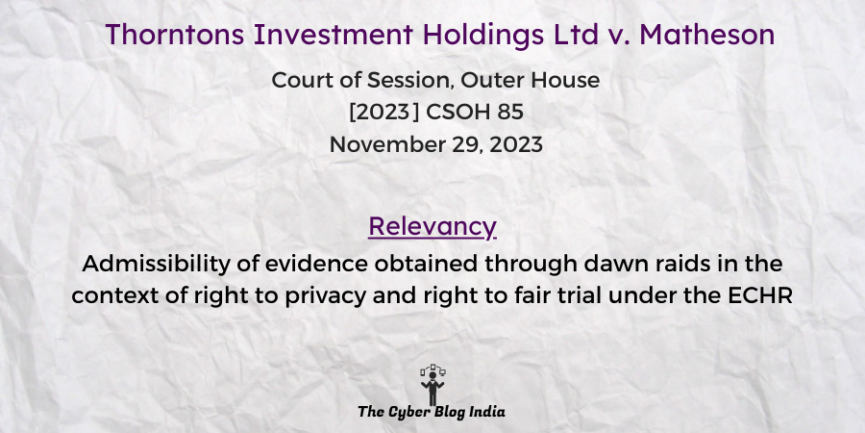Thorntons Investment Holdings Ltd v. Matheson

Thorntons Investment Holdings Ltd v. Matheson
[2023] CSOH 85 : 2023 S.L.T. 1305
In the Court of Session, Outer House
Before Lord Sandison
Decided on November 29, 2023
Relevancy of the case: Admissibility of evidence obtained through dawn raids in the context of right to privacy and right to fair trial under the ECHR
Statutes and Provisions Involved
- The Administration of Justice (Scotland) Act 1972 (Section 1)
- The European Convention on Human Rights 1950 (Article 6, 8)
Relevant Facts of the Case
- Thorntons Investment Holdings Ltd and associated pursuers received anonymous packages containing documents through mail.
- These documents allegedly included incriminating evidence against Matheson and associated individuals.
- Based on the information from these anonymous packages, the pursuers obtained court orders under Section 1 of the Administration of Justice (Scotland) Act 1972.
- The court orders permitted the pursuers to conduct “dawn raids,” which are surprise inspections and evidence collection at the defenders’ properties.
Prominent Arguments by the Counsels
The pursuer’s counsel argued that:
- The contents of anonymous packages were admissible in common law and under the European Convention on Human Rights (ECHR).
- The evidence obtained from the “dawn raids” was not tainted by the initial unlawful acquisition of the anonymous package contents.
The defender’s counsel argued that:
- The admissibility of the evidence from the anonymous packages violated Article 8 (right to privacy) and Article 6 (right to a fair trial) of the ECHR.
- The evidence obtained from the information in the anonymous packages should be inadmissible under the “fruit of the poisonous tree” doctrine.
Opinion of the Bench
- The anonymous packages’ evidence was admissible and did not unlawfully infringe on defenders’ rights under Articles 6 and 8 of the ECHR.
- The evidence collected during the “dawn raids” was admissible, noting that the court orders for the raids acted as an independent intervention.
- The scanned copies of the documents were reliable, and their admission did not prejudice the defenders. Thus, the best evidence rule was not violated.
Final Decision
- The court rejected objections to the admissibility of the anonymous packages and the evidence recovered, allowing the case to proceed.
